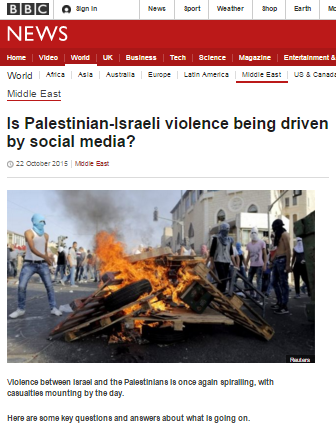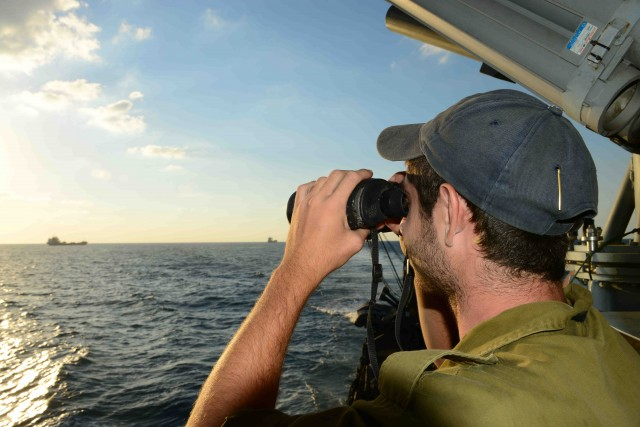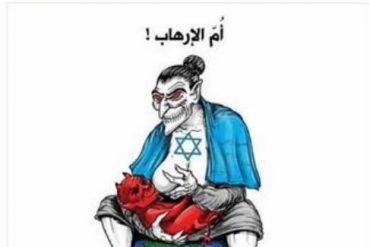Those visiting the BBC News website’s Middle East page may have come across an article currently going under the title “Is Palestinian-Israeli violence being driven by social media?” which was actually first published on October 13th and has undergone numerous changes since then.
The article, which purports to function as a backgrounder on the topic of the current wave of terror in Israel and has hence been promoted via links in several other reports, currently opens as follows:
“Violence between Israel and the Palestinians is once again spiralling, with casualties mounting by the day.
Here are some key questions and answers about what is going on.”
The question posed in its headline is addressed in a relatively small section of the report (fewer than 200 words) which actually does little to inform readers of the scale and significance of the role of incitement spread via social media in fueling the current wave of terror, of the kind of content appearing on such platforms or of the use of social media by official Palestinian groups other than Hamas – including Mahmoud Abbas’ Fatah party.
“While there is no clear evidence that the attacks have been centrally organised, some Palestinians have taken to social media to champion them.
Posts praising and encouraging attacks on Israelis have emerged on YouTube and Facebook, while Twitter hashtags including “Jerusalem Intifada” or “Intifada of the Knives” are gaining traction among Palestinians.
Israeli Prime Minister Benjamin has described the inflammatory use of social media as “Osama Bin Laden meets [Facebook founder] Mark Zuckerberg”.
A staged online video in the name of Hamas, the militant group which dominates Gaza, which portrayed an Arab bystander stabbing two “Jews” for bullying Arab children and called for a new intifada, was removed from Hamas’ YouTube channel after Israel’s foreign ministry complained that it glorified violence.
Many of the attacks and aftermath have been filmed on mobile phones and CCTV, getting quickly uploaded and shared. Israeli officials have expressed fear that images of assailants being shot could fuel anger and inspire further attacks.
Experts have also noticed a marked increase in anti-Arab rhetoric on Israeli social media sites, according to Israel’s Haaretz newspaper. It says the use of inciteful language among Israelis on the internet soared in the wake of the first stabbing attacks.”
The article purports to inform readers on the subject of “What is happening between Israelis and Palestinians?” and a photograph appearing under that sub-heading – which shows one of the fatalities from the October 13th terror attack on a bus in Jerusalem being removed from the scene – promotes a theme seen in much other BBC content:
“Israelis have been targeted in a growing number of apparent lone-wolf attacks”
Notably, one of the terrorists who carried out that attack was lauded by Hamas on social media.
The BBC’s account of “what is happening” of course does not include the use of the word terror.
“There has been a wave of stabbings and some gun attacks on Israelis by Palestinians since early October, and one apparent revenge stabbing by an Israeli.
The attacks, some of which have been fatal, have struck in Jerusalem, across Israel and in the occupied West Bank.
Israel has tightened security and clashed with rioting Palestinians, leading to deaths on the Palestinian side.
There has also been associated violence in the border area inside the neighbouring Gaza Strip.”
Embedded under the sub-heading “What’s behind the latest unrest?” is the previously published problematic backgrounder on Temple Mount by Yolande Knell. Readers are told that:
“Violence between the two communities has spiralled since clashes erupted at a flashpoint Jerusalem holy site in mid-September.
It was fuelled by rumours among Palestinians that Israel was attempting to alter in favour of Jews a delicate long-standing religious arrangement governing the site. Israel repeatedly dismissed the rumours as incitement.”
No mention is made of the fact that the intention of the violent rioting on Temple Mount “in mid-September” was to prevent Jews from visiting during a holiday – as was similarly the case previously on Tisha B’Av and later at Succot. The article then goes on to mislead readers by stating that stabbing attacks against Israelis “began” on October 3rd when in fact sixteen such attacks had already taken place in the first eight months of 2015.
“Soon afterwards, two Israelis travelling with their four children were shot dead by Palestinians in the West Bank. Two days later the stabbing attacks began.
Both Israel and the Palestinian authorities have accused one another of doing nothing to protect each other’s communities.
Israel says the Palestinian leadership is inciting attacks, and that the attackers are driven not by political frustration but by a radical religious ideology which opposes Israel’s very existence.
Palestinian Authority President Mahmoud Abbas has blamed “acts of aggression” by the Israeli authorities and Jewish settlers for the latest violence.”
As has been the case in all BBC coverage of this wave of terror, this backgrounder fails to tell readers in its own words that there is no basis to the conspiracy theories concerning a change in the status quo on Temple Mount and also neglects to inform them on the issue of Mahmoud Abbas’ incitement promoting that theme.
The article’s next sub-heading asks the rhetorical question “But isn’t there more to it than that?” and that section is illustrated using a photograph captioned:
“The war which followed Israel’s creation left generations of Palestinian refugees”.
Naturally, no effort is made to explain exactly why “generations” of Palestinian refugees inherit that title even whilst living under PA or Hamas rule or why those in Arab countries have been deliberately kept in that status. As usual, Jewish refugees from Arab lands do not get a mention in this article.
Readers are then told that the answer to the subheading’s question lies in “narratives” – with the BBC’s portrayal of the Palestinian narrative erasing the religious themes seen in the incitement fueling the current wave of terror from audience view and its paraphrasing of Israel’s position failing to inform readers of the legal basis for Israel’s existence.
“Yes. Much more. The current violence stems from decades of unresolved conflict between Israel and the Palestinians. At its most basic, it is a fight over land and national rights.
There are rival and seemingly incompatible historical narratives. The Palestinian position is that Israel was created on their land in 1948, turning many into refugees, and further occupied Palestinian territory, including East Jerusalem, in the 1967 Middle East war. They say any hoped-for future Palestinian state is being undermined by Israeli settlement-building in the occupied territories. The settlements are seen as illegal under international law, though Israel disputes this.
Added to this is Israel’s expansion in East Jerusalem, where the proportion of Jewish Israeli inhabitants has swelled compared to the number of Palestinian residents, and where Palestinian districts suffer from poor infrastructure and services.
Israel’s counter-position is that its right to exist is incontestable and that the Palestinian refugee problem is the result of wars forced on it by Arab neighbours. It says the Palestinian leadership – despite officially recognising Israel – have not proven they are willing to accept its permanence nor give up violence to achieve their aims.
Peace talks aimed at ending the conflict by creating a Palestinian state alongside Israel have repeatedly collapsed over the years and many on both sides have lost faith in the process.”
One paragraph in that account is particularly notable. Readers are told that “in East Jerusalem […] the proportion of Jewish Israeli inhabitants has swelled compared to the number of Palestinian residents”.
Quite how the BBC compares a “proportion” of Jews to a “number” of Palestinians is unclear but notably, no mention is made of the fact that all Jews living in what the corporation defines as “East Jerusalem” – which as we know, includes the Jewish Quarter of the Old City – were forcibly displaced by the Jordanian invasion in 1948. Hence, if even one Jew went to live in “East Jerusalem” after the Six Day War, the proportion of Jews living there would have risen.
But do the available statistics actually back up the BBC’s implication that there are more Jews than Palestinians in “East Jerusalem” either proportionally or in terms of actual numbers and that their proportion of the population in that area is ‘swelling’?
According to the Jerusalem Institute for Israel Studies, in 2003 a total of 403,263 Jerusalemites lived in areas the BBC defines as “East Jerusalem” including 173,500 Jews (some in neighbourhoods which did not exist before 1967, some in those which existed before 1948 such as Neve Ya’akov and the Jewish Quarter) and 224,028 Muslim and Christian Arabs. In other words, in 2003 Jews made up 43.02% of those living in “East Jerusalem”.
Ten years later, in 2013, the number of Jerusalemites living in the areas the BBC defines as “East Jerusalem” had risen to 509,440 and included 197,250 Jews (a rise of 23,750) and 305,470 Muslim and Christian Arabs (a rise of 81,442). In other words, Jews made up 38.7% of those living in “East Jerusalem” in 2013.
So in fact, contrary to the BBC’s claim that “in East Jerusalem […] the proportion of Jewish Israeli inhabitants has swelled compared to the number of Palestinian residents”, the actual number of Arab residents in those parts of the city rose more than the number of Jews and the percentage of Jews making up the total population of “East Jerusalem” fell during the decade 2003 – 2013.
Had the BBC confined itself to stating that the number of Jews living in what it terms “East Jerusalem” has risen since 1967, that claim would of course have been accurate – although sadly lacking in historic context. The claim as it stands, however, is inaccurate and misleading.
This backgrounder falls short of meeting its declared aim of providing “answers about what is going on” because it adheres to the selective framing of the story adopted by the BBC from the beginning of its coverage of the current wave of terror.
Any backgrounder genuinely seeking to provide information which would help audiences understand this topic could not ignore the issue of Palestinian Authority incitement and glorification of terrorism, would not obscure the religiously themed – and frequently racist – nature of that incitement and would not herd readers towards a view which obscures those uncomfortable issues by means of ‘contextualisation’ of the current wave of terrorism as “a fight over land and national rights”.
An article intended to mould readers’ perception of the story and advance a wider political narrative would, however, do exactly that.




